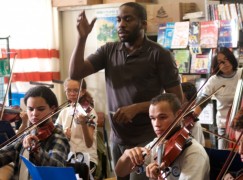US Congress integrates the arts into science education
mainAmericans for the Arts Action Fund has won what it claims to be a major concession on the school syllabus.
In the midst of the biggest shakeup of federal education law in over a decade, Congresswoman Suzanne Bonamici (D-OR) successfully added an amendment today to the rewrite of the nation’s Elementary and Secondary Education Act (ESEA) legislation that will integrate the arts into STEM education (science, technology, engineering and math).
The precise wording of the amendment is: integrating other academic subjects, including the arts, into STEM programs to increase participation in STEM, improve attainment of STEM-related skills, and promote well-rounded education.
That seems to mean the arts are still optional, and certainly inferior, to science teaching.
Or does this have an upside?

Full report here.





Comments